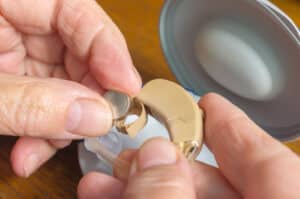Most hearing aids use small, disposable batteries to stay powered up. These batteries keep your device working at its highest level throughout the day while you’re at work or enjoying a meal with friends at Café Central.
However, for anyone using hearing aid batteries, it’s important to know how to store and care for them properly to prevent serious injury, especially if you have children in the home.
The Dangers of Accidentally Swallowing Hearing Aid Batteries for Children 
Young children are curious, and any tiny object is a potential health hazard if they accidentally ingest it. Disposable hearing aid batteries contain silver, mercury, lithium and other heavy metals. They can cause significant injury within two hours if lodged in a child’s esophagus.
If your child or grandchild swallows one of your hearing aid batteries, do not attempt first aid at home. This is a medical emergency, and they should be taken to the ER immediately for treatment. If the child is older than one year, you can give them two teaspoons of honey every 10 minutes until they arrive at the ER. This can help slow the development of burns caused by a leaking battery.
Whatever you do, do not delay medical care, as this can lead to serious internal burns, bleeding and has the potential to be fatal.
Signs your child may have ingested a hearing aid battery include:
- Wheezing
- Drooling
- Vomiting
- Chest discomfort
- Difficulty swallowing
- Gagging when attempting to eat or drink
Hearing aid batteries can also cause damage if your child gets one stuck in their nose or ear.
Safely Storing Hearing Aid Batteries
To prevent anyone (including pets) from experiencing a serious injury, it’s essential to store your hearing aid batteries in a safe place. To do so, follow these general storage guidelines:
- Invest in a container with a snap-tight lid.
- Place the container up on a higher shelf where you can reach it but children cannot.
- Store your batteries at room temperature and avoid putting them in the refrigerator. As opposed to popular belief, this does not extend battery life.
- Do not store batteries with metal objects like coins or keys.
- Do not keep your hearing aid batteries in the same place that you keep medication, as many pills are the same size and shape as the batteries.
For more safety tips or to schedule an appointment with a hearing aid expert, call Tinnitus & Hearing Experts today.
